
31 January 2008
30-day flu grips music industry!
From the Met's press office: "José Manuel Zapata will sing the role of Count Almaviva in Il Barbiere di Siviglia on Thursday, February 21 at 8 p.m., Monday, February 25 at 8 p.m., and Friday, February 29 at 8 p.m. He replaces Michael Schade, who is indisposed." [emphasis added]
Labels: chicago, florez, met, the subtle art of euphemism
30 January 2008
What do you think you are? A pair of queens?
 The Met officially announced today that the company will stage Anna Bolena for Anna Netrebko for the opening night of the 2011-2012 season (old news to you, cher public!) and, the following season, Maria Stuarda for Joyce DiDonato.
The Met officially announced today that the company will stage Anna Bolena for Anna Netrebko for the opening night of the 2011-2012 season (old news to you, cher public!) and, the following season, Maria Stuarda for Joyce DiDonato.The company has no current plans to produce Roberto Devereux. In what La Cieca is choosing to consider a stinging slap in the face to -- well, at least one soprano -- Peter Gelb explained, "The problem is casting ....There's no singer around today who can sing [Elisabetta]."
And you may make what you will of la Netrebko's statement about the Bolena: "Fortunately, it's far enough in the future that I'll have time to learn it really well."
Mot du jour
Labels: blog, giordani, maury d'annato, met
24 January 2008
Blackout
"At least five of the Met's operas this season are to be released on DVD under an agreement with EMI Classics," the story goes on to note. Which five, La Cieca wonders?
17 January 2008
Winter storms
Our own JJ reviews the Met's productions of Hansel and Gretel, Die Walküre and Un ballo in maschera in Gay City News. JJ's previous scribblings in the queer rag be found in the archives for 2007, 2006, 2005 and 2004.
15 January 2008
Anna as Anna?
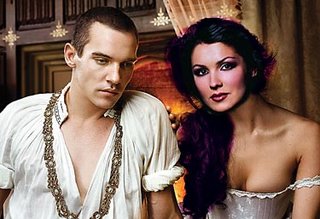 La Cieca is loath to scoop dear Bradley Wilber, but rumors are swirling once again about future seasons at the Met. Perhaps the most controversial (among the cher public, at least) of these plans is a new production of Anna Bolena to open the 2011 season, with Anna Netrebko's pretty head on the chopping block. Further casting at this point is not set, though La Cieca is confident that speculation will run rife in the comments section.
La Cieca is loath to scoop dear Bradley Wilber, but rumors are swirling once again about future seasons at the Met. Perhaps the most controversial (among the cher public, at least) of these plans is a new production of Anna Bolena to open the 2011 season, with Anna Netrebko's pretty head on the chopping block. Further casting at this point is not set, though La Cieca is confident that speculation will run rife in the comments section.Now, La Cieca is just going to suggest that we all don't go off the deep end instantly and unanimously here, despite what at least some of may regard as perfect justification for doing so.
It does seem apparent that if Netrebko is determined to do bel canto (not saying "should be doing" mind you), then Bolena does make more sense than, say, Puritani or Lucia. Anna (Mrs. Tudor, I mean) relies less on vocal brilliance qua brilliance than those two roles, and the "fiery" character of the rejected queen is the sort of dramatic type that appeals to Ms. Netrebko's lively theatrical instincts. We should also keep in mind that she now has more than three years of lead time and the availability of Scotto as a coach; as such she does have the opportunity to delve beyond a superficial reading of the music. (Again, no guarantees...)
It will also help, I think that the only "obligatory" sopracuto is the D at the end of the first act, a high interpolation so relatively that even Carol Vaness used to sing it.
But let's not get too far ahead of ourselves. Need La Cieca remind any of you that the duration from 2008 to 2001 is the equivalent of a century in Gelb Years. By that time we may end up with Christine Ebersole opening the season in Pikovaya Dama.
Your doyenne further has heard that the title role in Simon Boccanegra (2010-2011?) has been reassigned to Placido Domingo, with Thomas Hampson shifted into a revival of Macbeth -- opposite whom, La Cieca cannot venture to guess, though it's a safe bet the cover will be Cynthia Lawrence. Domingo, La Cieca hears, is already preparing an "out of town tryout" for Verdi's noble corsair with the Boston Symphony Orchestra.
But speaking of Macbeth, La Cieca regrettably has a previous engagement and so will not be able to take in this evening's Lawrence/Ataneli version of the Scottish Opera. Any volunteers to serve as Guest Critic?
Labels: 2010, 2011, domingo, guest critic, la cieca ci guarda la cieca ci vede, met, netrebko
12 January 2008
Shirley, no jest!
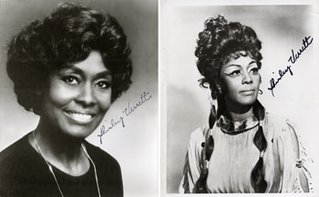 La Cieca hears that the one and only Miss Shirley Verrett will grace the airwaves this afternoon as an intermission guest during the broadcast of Macbeth.
La Cieca hears that the one and only Miss Shirley Verrett will grace the airwaves this afternoon as an intermission guest during the broadcast of Macbeth.Do join La Cieca in the comments section of this posting to enjoy this afternoon's broadcast -- especially the words of La Verrett!
11 January 2008
Željko can and Željko do
 Željko Lučic will sing Macbeth for the Met's broadcast and HD simulcast of the Verdi opera tomorrow afternoon, replacing Lado Ataneli, who is "indisposed."
Željko Lučic will sing Macbeth for the Met's broadcast and HD simulcast of the Verdi opera tomorrow afternoon, replacing Lado Ataneli, who is "indisposed."Labels: broadcast, la cieca ci guarda la cieca ci vede, met, sirius, telecast
10 January 2008
Fatal mia donna!
Labels: la cieca ci guarda la cieca ci vede, met
09 January 2008
02 January 2008
30 December 2007
La parola scenica
26 December 2007
Hair of the dog
Those of you not living in New York should check your local listings. And you'll have to cook your own hopping john.
20 December 2007
Le Scandale, 2007 edition
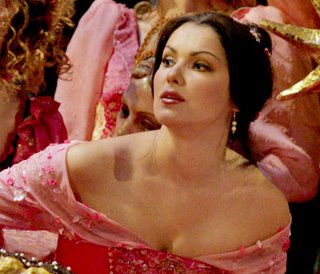 La Cieca should remind herself that much of this accidie springs from opera-l, which most of the time is a valuable resource and all that, but it does seem to be a haven for every tongue-clucking old maid still hunched over her Philco every Saturday afternoon during the broadcast season. (Some of them predate Texaco, La Cieca thinks.) Anyway, the consensus over at opera-l is that Netrebko is kaput, over, finished -- that is, assuming she was ever anything to start with. The Roméo et Juliette has been called "failure" and even (yes!) "debacle." Admittedly , La Cieca occasionally amuses herself by throwing those terms (including the "d" word) around indiscriminately, but she has the defense that nobody with half a brain takes her babbling seriously anyway. On the other hand, La Cieca has her doubts that everybody over at opera-l shares her sense of light-hearted irony in these things.
La Cieca should remind herself that much of this accidie springs from opera-l, which most of the time is a valuable resource and all that, but it does seem to be a haven for every tongue-clucking old maid still hunched over her Philco every Saturday afternoon during the broadcast season. (Some of them predate Texaco, La Cieca thinks.) Anyway, the consensus over at opera-l is that Netrebko is kaput, over, finished -- that is, assuming she was ever anything to start with. The Roméo et Juliette has been called "failure" and even (yes!) "debacle." Admittedly , La Cieca occasionally amuses herself by throwing those terms (including the "d" word) around indiscriminately, but she has the defense that nobody with half a brain takes her babbling seriously anyway. On the other hand, La Cieca has her doubts that everybody over at opera-l shares her sense of light-hearted irony in these things.Look. La Cieca regards herself as a very critical listener, but she simply cannot discern any "debacle" or even "failure" in last week's Roméo performance. Netrebko was admittedly somewhat off her best form at the beginning of the opera. She did have a minor crack on the high D in her first cadenza, and for most of the performance her voice sounded a bit cloudy and thick compared to what La Cieca (and, you, of course, cher public) have heard on Sirius and in the theater earlier this season.
La Cieca hesitates to jump to the conclusion that this one performance indicates an inevitable downward spiral toward ruin for Ms. Netrebko. She prefer to take the more cautious position that Netrebko was simply having a "B" voice day instead of her customary "A." The cause may have been nerves, or a mild case of acid reflux, or a minor allergy attack, or (who knows?) she may have been starting her period on Saturday. The point is, nerves and all the rest (including even dysmenhorrhea) don't last forever.
As, it so happens, tonight's Sirius broadcast neatly indicates. La Cieca tuned in at the beginning of the second act to hear Netrebko in fine fettle. Your doyenne will note also that in the bedroom duet tonight Netrebko is singing with a lighter tone and softer dynamics than she did opposite Roberto Alagna -- the better to blend with Joseph Kaiser's less aggressive approach, one assumes.
Well, enough scolding. A recent news story about Antonio Banderas' directing Carmen got La Cieca to thinking: how long before Angela Gheorghiu backs out of the projected Met production of the Bizet opera -- and how thrilling it would be if Netrebko could be persuaded to jump in!
Oh, and just so you don't think La Cieca has completely abandoned her position as Sultana of the Soupcons, here's a tidbit. Your doyenne hears that among
Labels: alagna, domingo, met, netrebko, rant, scandale, sirius
19 December 2007
Only in New York, Kids

"At High School of Enterprise, Business and Technology on Grand Street Campus in Brooklyn, the show is sold out at nearly 1000 tickets. The school didn’t spare any effort in terms of marketing: there’s a huge color banner for 'Live in HD' on the side of the building, facing Bushwick Avenue, with a picture of Anna Netrebko, who is singing Juliette, standing 20 feet tall. The school kids also put up posters in local eating establishments, including Grand Street Grill, their local bodega, and The Great Wall Chinese restaurant."
From metopera.org.
Labels: met, netrebko, peter gelb is a fucking genius, telecast
02 December 2007
29 November 2007
Running, standing and jumping Gaul
Our Own JJ reviews Hasmik Papian's Druidess in Gay City News.
28 November 2007
Divas on Demand!
Never at a loss for a sound bite, Met General Manager Peter Gelb quipped, "With this agreement, we are creating the opera equivalent of a Hollywood movie roll-out." The Met will join such established iN DEMAND attractions as major Hollywood films in HD, Major League Baseball, World Wrestling League, and original video programming such as America's Next Hot Pornstar: Naked Tryouts.
27 November 2007
Diva, from head to mistletoe
True confession: I love Maria Guleghina, I really, really love her. I know her flaws but her strengths are such that they sweep aside severe demerits that would consign any other artist to filth. Among contemporary singers she is one artist who thinks big, sings big with a big voice and gives everything she has even when it is more than she can afford vocally or artistically. She lives dangerously onstage and at the end of the night there is blood on the stage floor, sometimes hers, sometimes the composer's. She may flirt with vocal disaster but she is never routine or boring.
When she was announced as Norma, I felt some trepidation - would this be the breaking point in my love affair with the Russian diva? This is a role where guts and temperament can only get you so far. A lot of the substance of the role is written into the notes and the range of vocal demands is superhuman. Guleghina's rough, approximate singing at the "Macbeth" new production premiere had earned her critical brickbats (the second performance I attended was much better) and it seemed that bel canto was something beyond her reach at this point. Guleghina has sung Norma before but somewhat outside of the main international circuit and not for a few years.
Now I am sure that over the Sirius network this was not anywhere near a complete musical triumph. However in the house it was certainly impressive and often very, very moving. Guleghina's conception of the role is greater than her technical means of achieving it but she shirks nothing and doesn't shy way from emotional extremes or vocal challenges. As an actress and interpreter she is more consistently successful than as vocalist but she cannot be dismissed as totally provincial or crude. Though a few attempts at delicacy, accuracy and finesse may fail, others will surprise you by succeeding and she scored many points in her acting and singing. The voice is major and imposing and suggests a force of nature. Unlike Papian, she was a fearsome rival and didn't sound like the junior priestess next to Dolora Zajick's majestic Adalgisa.
First of all, she is glorious to behold on stage. She has lost some weight in anticipation of the January "Macbeth" satellite moviecast and the often rather soignée new gowns suited her. Tall and majestic with wide-set flashing eyes, she commanded the stage at all times.
Guleghina is often happiest when she can hurl her voice like steel javelins at the music - preferably in the higher range. Some of these vocal assaults miss the target but the energy and force is always exciting. However as Norma, Guleghina attempted many soft attacks, sustained piano singing and modulated phrasing. This in itself was admirable but years of daredevil oversinging are hard to shake off for one role. These piano phrases - including the opening and ending phrases of "Casta Diva" - suffered from hollow, unsteady tones and fell short of the intended pitch. Whereas Papian was capable of more lyricism and delicacy, Guleghina could sweep you away with passion and terrify you with her rage. The two divas strengths and weaknesses seem to be polar opposites of one another. Neither had pinpoint coloratura control but Guleghina had expressive vocal attack and excitement in her fioritura.
Guleghina's control of her forte top was better than before, none of the many B's and C's turned into a squall though she can sharp. She had good clean attacks on some of the killer high cadenzas which will swoop up to a high note and then spiral downward on a chromatic scale. The downward scale was often smeared and sloppy but the top was responsive including a short but firm high D at the end of the trio climaxing the first act.
Though the first act found Guleghina at times managing the role and thinking through her vocal choices phrase by phrase, the second act showed her in greater command of the role. As the role of Norma goes on the vocal gestures become broader and the phrases grander, better suiting Guleghina's big-boned vocal framework. The scene where Norma ponders murdering her children was a different woman from the proud and almost otherworldly priestess of the first scene - this was a tortured, desperate woman. The maternal aspects of the role were powerfully communicated - the way that she embraced her two boys you knew Guleghina has had children of her own. Maria managed to match Dolora phrase by phrase and staccato scale by staccato scale in "Mira, O Norma".
In the scenes where Norma incites the Gauls to battle showed Guleghina tearing up the stage as the epitome of the warrior diva. The confrontation with Pollione "In mia man alfin tu sei" showed one Norma who was truly in love with Pollione even as her anger turned her against him and eventually against herself. The final scene with the moving "Qual cor tradisti" and "Deh non volerli vittime" plumbed real depths of emotion. Guleghina's Norma was relieved to be able to admit her love and free herself from her lies even at the cost of her life. But then there were her children who were now unprotected. Guleghina's plea to her father could have moved a stone to tears.
Throughout there were pitch problems, phrases broken by inadequate breath control and approximated passage work. But also throughout was a real, larger than life yet very human Norma who was compelling and moving whether alone or interacting with her colleagues. Imperfect? Definitely, but this seemed to be the real thing unlike Papian's often elegant but unconvincing attempt at the role. So though the singing was anything but "casta" in many respects, the "diva" in her human and divine aspects propelled the story. At the end of the night there was blood on the stage but tears too and the fire of Bellini's genius burned brightly. -- Gualtier Maldè
Labels: bel canto, gualtier malde, guest critic, met, our own
26 November 2007
Si, parleremo terribile da queste querce antiche
Dare we hope tonight's performance will be as fabulous as this one?
22 November 2007
Something to give thanks for
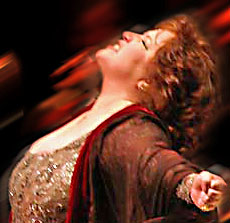 La Cieca hears that our dear Aprile Millo (who recently had to cancel a Teatro Grattacielo appearance due to illness) is ready to bounce back big time in 2008.
La Cieca hears that our dear Aprile Millo (who recently had to cancel a Teatro Grattacielo appearance due to illness) is ready to bounce back big time in 2008. Word on the street is that Millo will join longtime colleague Dolora Zajick for a bel canto duet in OONY's spring gala, followed by a return to the roster of the Metropolitan Opera for the 2008-09 season.
While we wait, here's some prime Millo via YouTube.
14 November 2007
Who's the missing star?
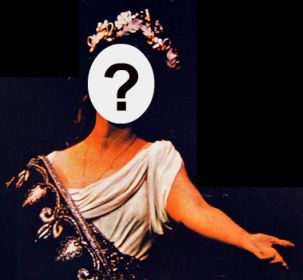 La Cieca was just wondering about something yesterday on opera-l, and doggone if Anne Midgette wasn't wondering about the same thing today in the New York Times. (That woman haunts my dreams, I tell you. It's like she's inside my head. Now, where was I? Oh, yes...) The point that dear Anne and I (among others) have mulling is this:
La Cieca was just wondering about something yesterday on opera-l, and doggone if Anne Midgette wasn't wondering about the same thing today in the New York Times. (That woman haunts my dreams, I tell you. It's like she's inside my head. Now, where was I? Oh, yes...) The point that dear Anne and I (among others) have mulling is this:There was a time when Norma was considered a rarity or at least an opera that could be revived only when a very special prima donna was available and willing. The first Met Norma, for example, was Lilli Lehmann, the house's biggest female star of that era. Even given Lehmann's réclame, her appearance as Norma was considered by at least one critic (W. J. Henderson in Times) to be a sort of stunt:
The opera was chosen by Fräu Lehmann for her benefit, and from a financial point of view her selection was a very wise one . . . . From an artistic point of view the choice does not seem to be so commendable. There is no artistic reason why Lilli Lehmann should present herself to the New York public as a colorature singer. She may have been actuated by a not unnatural desire to display her versatility, but to get up a performance of Bellini's "Norma" for her benefit savors rather of self-esteem than of a strong devotion to honest art . . . . She demonstrated that her voice possessed far more flexibility and that she had a greater command of the pure ornamentation of signing that anyone suspected ... It must be said, however, that Fräu Lehmann took many of the elaborate ornamental passages at a very moderate tempo and sang them with very evident labor, thus depriving them of much of that brilliancy which the smooth, mellow, pliable Italian voices impart to them. Fiorituri without brilliancy have no "raison d' étre," and no Italian diva of standing would have received half the applause that Fräu Lehmann did for singing these passages as she did. The audience was excited by astonishment at the fact that she could do it at all.Well, that was a longer pullquote than La Cieca originally intended to use, but, goodness, that is such excellent critical writing, isn't it? Anyway, back to the argument. Lehmann, Rosa Ponselle, Gina Cigna, Zinka Milanov and of course Maria Callas were all big established stars when they took on Norma at the Met. So were Joan Sutherland and Montserrat Caballé. If Shirley Verrett, Renata Scotto and Jane Eaglen received mixed reviews for their Met performances of the opera, it wasn't because of lack of star power or clout -- they were all extremely important names on the Met roster at the time of their casting.
Then there are performances from the likes of Adelaide Negri and Marisa Galvany -- (covers who had to go on) and Rita Hunter, one of the many jumpers-in for Caballé. The presence of Hasmik Papian at the beginning of this year's run of Norma should be understood in the same spirit, i.e., a late-in-the-game substitution.
Papian is going on for Maria Guleghina, who was pulled out of the beginning of the Norma run to perform the new production of Macbeth. So the question is, who ever dreamed up the notion of Guleghina singing Norma at the Met? True, she won a big popular success here with Abigaille back in 2001 and she more or less owned the role of Tosca at the house for about five years. But nothing in those performances (or, to be frank, her few attempts at the Bellini opera elsewhere) really shouts "this woman must do Norma at the Met." So why would a revival of Norma be put in the pipeline five years ago for a singer who neither then nor now promises to display anything special in the role?
Which is why La Cieca poses the question: was this revival of Norma originally planned for a different singer? And if so, who? Deborah Voigt? Violeta Urmana? Renée Fleming?
Labels: bel canto, caballe, critic, fleming, met, midgette, nyt, scotto, voigt
13 November 2007
Too much casta, not enough diva
Hasmik Papian is a hugely experienced Norma who some consider to be the best contemporary exponent of the role. But the key word here is contemporary not best. Her voice is not the conventional soprano drammatica d'agilita (with more or less agility) that has been associated with the role in the past. Instead it is a bright, high-placed floaty soprano of medium size. The tonal quality is an intriguing and not unattractive mixture of copper and silver. Gold and platinum probably are the elements needed for this role but she wasn't dealing in base vocal metals.
However, it is a voice without a great deal of variety of tonal color and the lower middle register is weak and colorless. This meant that this druidess shone in moments of reflection, tenderness and lyricism like the "Casta diva", "Ah, rimembranza" and "Deh, non volerli vittime" but fell way short in moments of wild anger and dark threatening command. The coloratura was decent but not brilliant. Some of the tricky runs were finessed and the climactic high C's were short and hardly effortless. Vocal thrust and command were in short supply all night. Her weakest moment of the evening was the second act trio with Pollione and Adalgisa. Here Papian seemed lost and clueless as to how to make an effect. She lacks really exciting vocal attack and could not dominate the ensemble. However, Papian did stronger work in the final scenes with solid vocalism and shone in the final moving scenes of renunciation and self-sacrifice.
Papian, a slim shapely woman who was sporting three newly designed and created gowns in blue crushed silk, russet velvet and scarlet velvet with gold accents was an unusually youthful and feminine Norma. One wondered what Pollione and the Gauls were intimidated by. Her anger came across more as agitated distress and her threats seemed mere sarcastic insinuation. The real emotional depths of the part seemed sketched in skilfully but not fully plumbed.
This was contrasted against the heroic yet vulnerable Adalgisa of Dolora Zajick who had the attack and vocal breadth but also depth of feeling and variety of color as the junior priestess. I think in the 19th century Zajick would have been a Norma with whatever adjustments to the vocal line were needed for her comfort and endurance in the role. Zajick showed herself a mistress of vocal coloration and dynamic control. Like Cossotto she removed a lot of the steel and chest coloration from her tone and sang Adalgisa with gentle purity to suggest a virginal, innocent and youthful woman. The soprano-like tone did not preclude power and richness when appropriate but informed the tonal palette - she most often chose to end phrases piano rather than forte and didn't slam into low notes. She performed a flawless messa di voce on "Io l'obbliai" and also managed a pianissimo high C in the second act. Dolora had the grandeur both vocal and physical that Papian lacked.
Franco Farina is a confounding artist, seemingly a Jekyll and Hyde vocalist. A superb musician with excellent technical control in lyrical legato lines and piano singing, he devolves into a braying, wobbling, unmusical shouter when he attempts robusto heroics. At times it seems that a Pertile or Bergonzi are within him fighting for his soul against Baum and Mauro. The whining, blown-out upper middle tones were contrasted against a firm, bright and expert shaped line in cantilena. He managed a superb piano tone in the duet with Adalgisa and when striving for line and style was really impressive. But here or there a loosening tone or shouted high note would intrude and remind you of his dark side. The costume suited him and he worked well with both ladies.
Vitalij Kowaljow poured on rich velvet tones in the musically rich but dramatically uninteresting role of Oroveso. Juliana di Giacomo gave notice of a major soprano voice in the small role of Clotilde in her Met debut. The two boys playing Norma's children were given more specific direction including reaching out for their mother in the last scene with moving results.
I happened to like the conducting of Maurizio Benini who stressed the dramatic weight and symphonic qualities of the score while not slighting elegance and forward movement. This score too often has fallen into the hands of routiniers and this was a step in the right direction.
I won't devote much space to John Copley's production and John Conklin's sets because they don't deserve it. Norma is an opera that seems to confound modern directors. Why Norma decorated her house with wooden crates painted black is not something this inquiring mind wanted to know. Sometimes it looked like a high school production of Shakespeare's Macbeth or a minimalist Camelot. Laurie Feldman who staged this revival attempted some creative choral movement but it was pretty much park and bark. Despite the cheapo minimalist look they might as well have been singing in front of musty old drops of Stonehenge and paper maché rocks.
After the dismal last two outings with a way past-it Renata Scotto (please no historical revisionism here - she could not sing the role by the time she got to the Met) and a never-really-had-it lumpen Jane Eaglen, last night restored Bellini's opera to musical respectability. One could get a sense of its greatness, particularly when Zajick was center stage. But the real fire and ice was last seen with Caballé in 1976 and we are still awaiting her successor. -- Gualtier Maldè
Labels: gualtier malde, met
02 November 2007
Macbetty
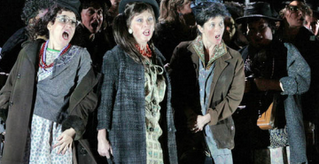 "When the Met last offered Verdi's Macbeth a quarter century ago, the New York Times slammed Sir Peter Hall's staging as 'the worst new production to struggle onto the Metropolitan Opera's stage in modern history' and the opening night audience greeted the curtain calls with some of the loudest boos in the theater's history. On October 22, the company neatly avoided a reprise of this notorious fiasco when they offered a bland take on the opera unlikely to rouse much strong feeling at all. "
"When the Met last offered Verdi's Macbeth a quarter century ago, the New York Times slammed Sir Peter Hall's staging as 'the worst new production to struggle onto the Metropolitan Opera's stage in modern history' and the opening night audience greeted the curtain calls with some of the loudest boos in the theater's history. On October 22, the company neatly avoided a reprise of this notorious fiasco when they offered a bland take on the opera unlikely to rouse much strong feeling at all. "Our Own JJ reviews Macbeth in Gay City News.
31 October 2007
Remember, La Cieca is just the messenger
Today at the final dress, it was pretty obvious why Reneeeeee would cancel her Normas – the "Sempre libera" was SCARY bad – completely off the voice for the mewing and really sloppy coloratura, and then she had to go back on-voice to try and get to the Bb/B/C/Db area. The repeated C’s were especially hair-raising, and she didn’t actually get up to the pitch on any of them in the whole aria. A friend [also] watching the dress said it was uncomfortable and worrisome to have to listen to her try and get through it. While she can still produce creamy sounds in her basic rep, her ability to sing fioritura (which, while totally wrong for bel canto, was impressive at one time) is basically gone.
Labels: fleming, la cieca ci guarda la cieca ci vede, met
29 October 2007
Nibble, nibble, mousie, who's nibbling at my gallery?
 The Gallery Met -- you know, that space off to the opposite side of the box office, over near the State Theater? Oh, didn't you know there was a gallery there? Well, in fact, neither did much of anyone else, judging by the sparse attendance there ever since they removed the lesbian erotica (that is, the Richard Prince piece about Madama Butterfly, which La Cieca thought was kind of fun). Now, let's see. La Cieca knows she asked you here for a reason... oh, yes, of course! There's actually a new exhibition opening at the Gallery Met, a sort of tie-in with the New Yorker, which certainly sounds like a nice intersection of target audiences.
The Gallery Met -- you know, that space off to the opposite side of the box office, over near the State Theater? Oh, didn't you know there was a gallery there? Well, in fact, neither did much of anyone else, judging by the sparse attendance there ever since they removed the lesbian erotica (that is, the Richard Prince piece about Madama Butterfly, which La Cieca thought was kind of fun). Now, let's see. La Cieca knows she asked you here for a reason... oh, yes, of course! There's actually a new exhibition opening at the Gallery Met, a sort of tie-in with the New Yorker, which certainly sounds like a nice intersection of target audiences.Gallery Met has assembled together artists from the venerable magazine, plus a few special guests, in a colorful exhibition of new, original artworks titled Hansel and Gretel. The exhibition features such familiar New Yorker names as Roz Chast, Ian Falconer, Jules Feiffer, Ana Juan, Ed Koren, Anita Kunz, Lorenzo Mattotti, Christoph Niemann, Lou Romano, Owen Smith, William Steig, Gahan Wilson, and Bob Zoell. The exhibit also features new works by artists John Currin, George Condo, and William Wegman—also inspired by Hansel and Gretel.
The Met's new production of the Humperdinck opera opens December 24. The gallery exhibition will be on view Friday, November 16 through February 2006.
Labels: lesbian erotica, met, unfunny cartoons
27 October 2007
Does a big voice need defending?
I'd like to admit a guilty pleasure of mine: I've secretly been waiting with a lot of anticipation for Maria Guleghina to sing in Macbeth and Norma this year. I have not told this to many people because it seems that the common expectation has been that she would be just short of a train wreck in both roles. Many of my wise opera buddies have commented on her wild/out-of-control/harsh/shrill/screamy/erratic voice and technique, and her inability to execute coloratura work. Yet anyone who saw Trittico or Cavalleria last season must have realized she's in prime mid-late career voice at the moment. Many who already commented on the Sirius broadcast from tonight (10/26) heard it right - she had a GREAT night in Macbeth.
I am an advocate of giving artists the benefit of the doubt when they have an off night because I am aware of the pressures and intricate details that can affect the voice at any given performance. I hate to be present when it occurs (who does at these prices) but it happens. I refused to comment in depth about the singing in the Lucia two weeks ago for just that reason. My return visit to that opera last night unfortunately confirmed most of my initial impressions (excepting of course the pleasure of Stephen Costello's debut as Edgardo and the secure high acrobatic singing of Annick Massis), however my impression of Macbeth, especially in regard to Guleghina couldn't be further from the negative reviews I read in major publications.
Most of the press fell over themselves in praise for Dessay in Lucia, yet claim the new Macbeth is "flawed", "lacking", and "sub-par" due to the performance of Maria Guleghina. To put Dessay on such a pedestal and then savage Guleghina just isn't right. As told to me by a Met employee Mme. Guleghina was very hurt and upset by the press reaction to her performance. Tonight she took the opportunity of being in voice to prove them wrong.
As seen and heard from Parterre Box 5 Guleghina gave penetrating insight, virile sexuality, and a HUGE voice to the part. I'm not much of a fan of "heroic" style belting (you all can keep Dimitrova and her like), but there is something to be said for the visceral thrill of hearing Maria hurl off her high notes at maximum tension. I heartily welcome it in the age of Fleming, Gheorghiu, Netrebko, et al. And OH how that sound dominated the ensemble at the end of the Banquet Scene (Turandot anyone?) And she certainly does have the ability to sing many florid passages extremely well.
What I particularly appreciated was how she took her big voice and scaled it down for certain passages in order to execute some of the coloratura. She did this quite successfully in "La luce langue" and the Brindisi, less so in "Vieni t'affretta!" because she was using too big a sound. But come on people, give her a few minutes to warm up! Honestly, she did some stuff vocally that I didn't think she could do - the acuti in the Brindisi were really crisp, and I particularly enjoyed the way she used the staccato to pop up to the top note of the scale and how she beautifully handled those melismas.
On the acting side she totally showed her lust and love for Macbeth. This was not a cold hearted Lady - but more a victim of her blood lust through their greed for power and passion for each other. When Marton played the role (my only other experience with the opera in live performance) I recall her as coming off very sexless - not to say without passion - but lacking in femininity. Guleghina uses her body and her sex appeal openly in the role and it brings just the right edge of warmth to make you believe that she's not in it for herself, she's in it because she loves her man (and this sex appeal and femininity will no doubt add the flame to her Turandot in the 09/10 season). It makes the Sleepwalking Scene really tragic. This aria was concentrated, intense, without being all over the place as many an operatic mad scene can be (no I will not mention any names). She doesn't have a pianissimo D flat to end the scene, so she opted to get the note at full voice securely for a moment facing upstage and then take the scale down. Aside from that my only criticism is that she doesn't really possess any chest voice, and I miss that dark quality in the low lying notes of this part. "Chest Nuts," as Marilyn Horne refers to them, may wish to skip this performance.
Banquo appears to be much more suited to John Relyea's current vocal state than Raimondo in Lucia was the night before. He didn't polish all the wool out of his tone, but it seems to lie in a warmer, lower place of his range. He looked really handsome too. This was probably my favorite of the performances I've seen from him.
I've heard impressions from people of Zeljko Lucic as Macbeth that range from excellent to miscast. I found his voice very pleasant - warm, excellent dynamic control, emotional - if perhaps lacking Verdian "boom" for the biggest moments. I liked his portrayal as a wounded king at once hungry to ascend the throne yet unable to live anymore with the burden of his bloody actions. He doesn't shy away from playing his emotional wounds and softer side. The phrasing in "Pieta, rispetto, amore" was superb. Staged with him sitting in a chair he communicated in a unique way Macbeth's need to believe the prophesy of the Witches and the underlying resignation that everything is about to fall apart. It was heartbreaking in its simplicity and received the biggest amount of solo applause of the evening.
Dimitri Pittas as Macduff was a surprise - bright and clear voice (with maybe not the best Italian vowels), and the lament for his family was a nice moment. The orchestra is in top form, and I'm not crazy about James Levine conducting Verdi most of the time, but the dynamic range was extraordinary - dead silent pauses leading to giant chords bombasting out into space, heavenly strings, and all very carefully calibrated to the singers onstage (another thing I noticed that differed from many pro reviews). From my box I could actually see Levine singing along with most of the singers for a good portion of the evening, very much enjoying making music with them.
And now for the bad news. The sets incorporate a mishmash of stylistic elements, from moving pillars of black stone that have light-up fluorescent bands in them, to green lasers projected onto the black sky for the arrival of the eight Kings from on high (straight out the The Saint circa 1979), a blue egg that raises from the stage to illuminate the apparitions, a jeep that is pushed around onstage, with all of this taking place on a giant black rock disk. It's a tidy and minimal production, not cheap looking, relying on simple props, set pieces, some nice back drops and sometimes elegant lighting effects (and a lot of stage smoke).
But what got me were the witches. They are dressed in a get up that I really don't understand. Were they bag ladies? A coven of local fishwives that meet secretly to conjure spells (and practice spastic dance moves)? While I liked Adrian Noble's direction of the principals, some of his choices just don't cohere with the rest. I don't mind updated or abstract productions if it is all of a whole. Granted I am not versed on post WW2 Scotland, so maybe it made sense, but I wish we'd been let in on what was up with those witches.
On the plus side Noble could give Mary Zimmerman a couple of pointers on how to deal with a static chorus. It looked like he had twice as many people on stage for the Banquet, most of whom must stand and watch in disbelief as Macbeth sees the ghost of Banquo, yet there was a fluidity and tension that didn't exist in the Mad Scene I saw again at Lucia the night before. This Macbeth plays well in spite of the questionable taste and stylistic incongruities which are at worst mildly annoying but really don't affect the commitment of the musicians and singers in producing a fine evening of Verdi. -- Little Stevie
Labels: critic, levine, little stevie, met, our own
26 October 2007
Di faci tuttavia splende il Costello!
The Met has often been accused and rightly so of ignoring young talent and waiting too long to hire up-and-coming new stars while hanging on to declining old favorites well past their sell-by date. Occasionally a promising new talent from the Young Artists Program will blossom quickly and get chances - Dwayne Croft fifteen years ago is an example.
However, it was a surprise when James Levine announced 26 year-old Stephen Costello for one performance of Edgardo in Lucia this season. He had definitely made an impression as Arturo on opening night and I have been told did impressively subbing for Giordani as Edgardo in some early rehearsals. It was with a mix of trepidation and excitement that I attended last night's performance. Making a starring role debut at age 26 in a house the size of the Met is a daunting experience for anyone.
Well, how was he? This much can be said - he immediately got the audience on his side and got the biggest ovation at the end (admittedly many family members, schoolmates and friends were in the audience but not that many). His youth, sweet timbre, precocious poise and emotional involvement communicated to the audience. However, the role of Edgardo, though lyric, is demanding with a wide range of dynamics, vocal coloration and requires both declamation and floated legato. Costello's voice seemed a size too small for the role in a house this large. Though he wasn't inaudible, he definitely seemed lightweight vocally. He seemed boyish and slight next to Annick Massis who is hardly a Lucia in the Sutherland/Callas heroic mold.
The elegant phrasing and poised musicianship were juxtaposed against a voice that could turn shallow and a touch insecure when pressures mounted. Lyrical moments like "Verranno a te" and "Fra poco a me ricovero" were sweet and pleasing. Declamatory moments like the outbursts in the "maledizione" scene and confrontation with Enrico in "Wolf's Crag" found the young man working close to his limits. The fact that he didn't push well beyond those limits and lasted in fairly fresh form to the end of the opera speaks well for his pacing and intelligence. A naturally appealing and graceful stage presence, he gained in dramatic authority as the evening progressed culminating in a moving death scene.
However, at this juncture he might be wise to leave the Edgardo to smaller theaters and concentrate on roles like Ernesto, Nadir and Nemorino that could capitalize on his soaring upper register and boyish charm and let himself grow into roles like the Duke of Mantua, Edgardo, Rodolfo and Alfredo with time.
A salutory example currently singing on the Met roster is Matthew Polenzani who started modestly at the Met seven or eight years ago singing parts like Jacquino and Lindoro and now in his thirties is moving into Romeo, Edgardo and Alfredo internationally with superb notices. It isn't a splashy overnight star trajectory but it worked for him and the Met and when the big star roles came, he was fully formed and ready to do them and himself full justice.
The evening really belonged to the elegant Lucia of French coloratura Annick Massis. Her voice is creamier and softer-textured than that of Natalie Dessay but she has a fuller and more reliable upper extension. A patrician stage figure, her acting was detailed and intelligent but lacked the "in the moment" intensity and spontaneity that Dessay brings to her work. There were pluses both musical and dramatic to Massis' more calculated approach - she never lost vocal poise and beauty and her performance was consistent and beautifully paced.
The loss of some dramatic excitement definitely had musical gains and resulted in a performance that gave overall pleasure. The flute obbligato in the cadenza of the mad scene was reinstated for her as was about 95% of the traditional Mathilde Marchesi cadenza minus the top E flats. Those were abundant elsewhere and held to exciting effect.
Kwiecien shows greater command and suavity in his Enrico, singing more judiciously in the beginning but having lots of power when needed - especially in his climactic top notes. John Relyea has a hint of graininess and dryness in his tone that is worrying in an artist who is still fairly young. I miss the vocal velvet of his earlier days. He was solid but not exciting.
Mr. Costello came through his trial by fire with grace and made some new fans. Now, he needs to pace himself wisely singing lighter roles at the Met and letting his voice and technique mature in the smaller and medium size houses until he is ready to tackle the major lyric repertoire here and internationally. The stuff was definitely there last night, but in embryo. -- Gualtier Maldè
Labels: broadcast, gualtier malde, met, our own, stephen costello
24 October 2007
Radamès, non è deciso il tuo fato
La Cieca's idle speculation: it should be simple enough to get someone in to sing a single performance of Pinkerton on the evening of October 27, which would free up Roberto di Nazareth. La Cieca's prediction: not bloody likely, but she's been wrong before.
23 October 2007
Put our service to the test
La Nilsson's performance (as awesome as it is!) is only an opening gambit, of course. La Cieca wants to throw the floor open to discussion of last night's Macbeth at the Met.
19 October 2007
"Bizarre and nondescript characters corralled from every stratum of society"
That show at least seems possible actually to transpire, unlike the new Carmen in 2010. The announced team for the Bizet, which includes Matthew Bourne, Richard Eyre, Angela Gheorghiu, Roberto Alagna, Barbara Fritolli and James Levine, surely adds up to ten pounds of diva in a five pound bag!
Labels: 2009, 2010, alagna, gheorghiu, jonas kaufmann, levine, met, scandale
18 October 2007
Alagna, Anna again to bed
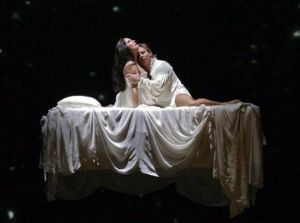 Of course, cher public, you heard it about it here a few weeks ago, but La Cieca has just read a press release from the Met announcing that, yes indeed, Roberto Alagna will reprise his Roméo opposite Anna Netrebko on December 12 and 15. (Our Own Gualtier Maldè, as you no doubt recall, confirmed the rumor when he spoke to Alagna after Aida on Tuesday night.) The December 15 matinee of Roméo et Juliette is the first of this season's "Live in High Definition" transmissions to movie theaters around the world.
Of course, cher public, you heard it about it here a few weeks ago, but La Cieca has just read a press release from the Met announcing that, yes indeed, Roberto Alagna will reprise his Roméo opposite Anna Netrebko on December 12 and 15. (Our Own Gualtier Maldè, as you no doubt recall, confirmed the rumor when he spoke to Alagna after Aida on Tuesday night.) The December 15 matinee of Roméo et Juliette is the first of this season's "Live in High Definition" transmissions to movie theaters around the world.Joseph Kaiser is Roméo on December 8 and 20, and finishing up the batting order will be Matthew Polenzani on December 27 and 31.
Labels: 2007, alagna, gualtier malde, la cieca ci guarda la cieca ci vede, met, netrebko, our own, telecast
Hollanderizing
Verdi has a way of testing his singers at the opening curtain. (See also "La Traviata," Act I, Scene 1.)
17 October 2007
Bobby takes one for the team
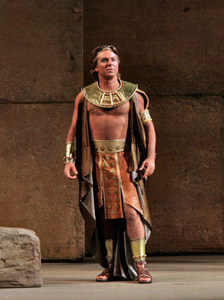 So, was last night a triumph or a disaster? Well, it was neither since the role of Radames doesn't play to all of Roberto Alagna
So, was last night a triumph or a disaster? Well, it was neither since the role of Radames doesn't play to all of Roberto AlagnaWas Alagna overparted or inaudible? Not at all. Really in some ways the role of Radames is easier than Romeo
Oddly enough, despite its reputation as being a "robusto" tenor role, the part of Radames has long stretches of lyrical singing. "Celeste Aida" is a love song, not a call to arms. The Temple Scene is prayerful, the Nile scene love duet is romantic and impetuous. The Tomb Scene also requires lyricism and pianos. I think that Karajan or somebody told Carreras (or was it Pavarotti?) that the only phrase that requires real dramatic declamation is the last phrase of the Nile scene "Sacerdote, io resto a te!".
In the best lyric Radames tradition (think Gigli, Bjorling and Pavarotti - though not quite in their league) Alagna treated "Celeste Aida" as a love song sung mostly mezza voce with a lot of sensitive coloring and phrasing. He hit the final B flat forte and repeated the phrase softly an octave lower as Richard Tucker did for Toscanini.
It helped that he had the most romantic appearance of any Radames since Corelli. In the first scene he was bare-chested (and looking slimmer than he did last year at La Scala) with a gold metallic collar, cape tucked around his shoulders, gold arm bands and leather peplum and gold sandals (not elevator sandals as he wore at La Scala). He looked very sexy with nice pecs with just the right amount of chest hair. The applause at the end of the aria seemed to please Roberto no end and he smiled joyously at the audience and seemed to feel vindicated and happy to have a chance to put last year's disaster behind him.
Then he made the first of a few musical mistakes (understandable given the circumstances) in the duet with Amneris before Aida goes on. (This is the same piece of music that marked his exit at La Scala) Dolora and the conductor got him back on track and things went quite well from there on. Alagna was occasionally covered by Dolora but reached a pretty good balance with Angela M. Brown.
His lack of an easy and integrated piano was a problem in the Temple Scene which was just okay. His contribution to the Triumphal Scene was solid but Radames doesn't have much to do there. The Nile Scene had his biggest challenges and most distinctive successes. Alagna's top carried him well in this scene ringing out reliably though his lower range can get grainy and woolly-sounding. The duet with Aida was full of interesting nuances and verbal expression that many Radames miss or ignore. Here finally he got some nice diminuendos. The final outburst to Ramfis was broad-phrased and ringing with a prolonged final note.
The "Gia i sacerdoti adunansi" duet with Amneris was well-done though Dolora definitely held back a bit for him and both she and Roberto got out of sync with the conductor. The final "A Terra Addio" duet with Angela Brown was some of his best singing of the evening matched by Brown, both spinning out gorgeous piano phrases. He didn't seem tired at the end and gained strength as he went on.
He acted more than most Radames do and he was visually credible as the romantic bone of contention between two passionate women (less so as a warrior and leader of men). However, the role still is two dimensional and more complex, vulnerable heros like Romeo, Rodolfo in Boheme and Des Grieux in Manon show better what Alagna can do as an actor. His timbre is a little odd-sounding in Verdi. It has a white wine quality - a combination of bright-toned forward tartness on the top with a hint of fruity mellowness below that is ideal for French repertoire but a little exotic in standard Italian opera.
The whole performance was a refreshing change of pace from business-as-usual tenor bombast and highlighted qualities in the role that are often missed. Was it ideal?, was it what we are used to? No. But it was interesting and I mean that in a good way.
Ms. Brown has all the vocal attributes of a great Aida but couldn't pull together an even line as she moved from high to low or forte to piano or declamatory to legato. Whenever she had to change pace (which is often in this demanding role) Brown had a momentary loss of vocal control and focus while the voice changed dynamics or register. This meant that unsettled phrases were then followed by swaths of gorgeous tone. But the bumps did take their toll, particularly on the high C in "O Patria Mia" which started to go badly awry and then was truncated.
Dolora was the pro she is and has been for a very long time giving more vulnerable colors to Amneris but still sounding the brass when needed. Dobber had a handsome compact tone and suave phrasing as Amonasro with a nice mahogany finish to the timbre but also needed a bit more bite - Di Luna might suit him better. Kowaljow was sonorous and solid as Ramfis and Reinhard Hagen had a pleasing but somewhat unimposing debut as the King. Ono does better with the orchestra players than he does with the singers and lacks the slancio and dramatic phrasing that Italians have in their blood in this music. He is a very intelligent musician and, once again, this wasn't a routine reading of the score. -- Gualtier Maldè
Labels: alagna, gualtier malde, met, review
15 October 2007
Tenor-go-round
13 October 2007
The season begins. Finally.
Labels: 2007, bel canto, critic, dessay, gcn, giordani, hunkentenor, met, netrebko, nyco, review, stephen costello
11 October 2007
Chi vi frena in tal momento?
Labels: met, stephen costello
10 October 2007
She gets too hungry for dinner at eight
Labels: festoonery, met, world leaders dancing in underwear
Someone else does the heavy lifting for a change
Take this as you will: based on this evenings performance the new Met Lucia is pretty bad. The acclaimed Ms. Zimmerman simply doesn't know how to direct opera. The chorus work was among the WORST I have ever seen in any theatre - no motivation, and some of the most boring groupings you can imagine - very static. The highly touted "nuanced portrayals" of the principles translates to "can't get the performances past the footlights". As viewed from Parterre Box 12 tonight, my impression was that the relationships were so poorly realized that everyone was acting in their own opera with no connection happening between any of them. Dessay and Giordani hit the mark in the Act 1 love duet, but prior to and after that the opera turned into an emotional black hole.
As each act came about I could feel the performance slipping away dramatically. This was unfortunate for Ms. Dessay's Mad Scene - which was very well sung, with reinstated pages of music new to my ears, and extremely interesting and difficult coloratura tailored to her abilities. If the opera had actually built up to this scene it would have been an experience to remember. The production lets her down, and the scene is an island in a vast ocean of emptiness. You really must experience Act 3 Sc. 1 between Edgardo and Enrico to believe it. Passionless, limp, "cross the stage on this line" type of directing - no conflict, no danger. It played as thought they were an East Village avant garde opera troupe making fun of the structure of the piece in a deconstructionist production. There was barely enough applause to cover the time to black out and raise the scrim (see below) on Sc. 2.
I have read that Ms. Zimmerman traveled with her designers to Scotland to soak up local color and get inspiration for this production. Well the only thing they seemed to have soaked up are several hundred gallons of sea foam green paint, and not a very stage worthy or pleasant shade either. Based on the designs released prior to opening I was expecting darkly foreboding landscapes, expressionistic backgrounds, gloomy yet appropriate spaces. The grassy mound in Act 1 works, yet I couldn't shake the feeling that it was the anorexic sister of the Met's Parsifal set. Act 2 is a deluge of the aforementioned "sea foam green" - from the floor to way up past our site lines - all three walls of the set.
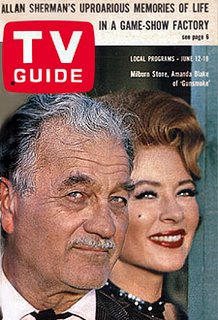 Act 3 is where it really falls apart. Scene 1: Lightning out of your local carnival's "spooky house" housed in a black scrim that materializes into Wolf's Crag Castle thanks to two cutouts at top and bottom with part of the Scene 2 stairs sticking out. Edgardo enters to a bare stage with your uncle's ugly yellow wing backed chair the only piece on stage. Scene 2 was the most confusing - the costumes, giant wooden stairs and balcony (read faux-finished cat walk) seemed to place the scene in the Wild West and looked to be straight out of Miss Kitty's Saloon from Gunsmoke!! Perhaps up close the impression was richer, but from my seat it sure didn't read as Scotland. The Ravenswoods cemetery was a particular embarrassment - 2 or 3 cutout headstones that looked to be supported in the back by 2x4's. Cheap cheap CHEAP!
Act 3 is where it really falls apart. Scene 1: Lightning out of your local carnival's "spooky house" housed in a black scrim that materializes into Wolf's Crag Castle thanks to two cutouts at top and bottom with part of the Scene 2 stairs sticking out. Edgardo enters to a bare stage with your uncle's ugly yellow wing backed chair the only piece on stage. Scene 2 was the most confusing - the costumes, giant wooden stairs and balcony (read faux-finished cat walk) seemed to place the scene in the Wild West and looked to be straight out of Miss Kitty's Saloon from Gunsmoke!! Perhaps up close the impression was richer, but from my seat it sure didn't read as Scotland. The Ravenswoods cemetery was a particular embarrassment - 2 or 3 cutout headstones that looked to be supported in the back by 2x4's. Cheap cheap CHEAP!The singing was OK. Myers (as Normanno in Act 1 Sc. 1) was inaudible when the ensemble was singing, and weak on solo lines. Relyea was wooly and tended to go flat. Giordani was Giordani - very good but just shy of superstar tenor quality. Kwiecien - I wish I could rave - but he has one dynamic - mezzo forte - a short breath line - and was quite cardboard tonight. He also really sang over Dessay in their scenes together. Stephen Costello projected youth, vigor, and a super fine tenor that has alot of ring top to bottom, though the absolute top didn't quite bloom bigger as one might want - but what a fantastic sound. -- Little Stevie
If you would like to be a guest critic on parterre.com, please contact La Cieca. First priority will be given to regular commenters.
Labels: dessay, giordani, guest critic, met, stephen costello
06 October 2007
Serial monogamy
UPDATE: The Met's website (already!) reports on Giordani's "rescue act" and, incidentally, provides a few minutes of the opening night Lucia on video.
Labels: giordani, la cieca ci guarda la cieca ci vede, met
05 October 2007
"Hunkentenor" makes broadcast debut
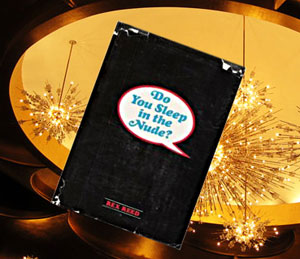 UPDATE: And now, my dears, we've even reached the AP! (How long before we're on the UP and every other damn P?)
UPDATE: And now, my dears, we've even reached the AP! (How long before we're on the UP and every other damn P?)La Cieca's young, young, young friend Maury D'anatto writes: "Too funny, La Cieca: did you coin hunkentenor? Because there was just this intermission interview with Joseph Kaiser that went somewhat off the rails as Margaret Juntwait asked JK if he had heard people call him a hunkentenor, and then through some rather complicated chain of associations, he revealed that he sleeps naked. It was awkward/hilarious."
Well, yes, La Cieca will have to plead "guilty" to coining this suddenly mainstream term; however it is you, cher public, who have catapulted it into the lexicon. Brava, you go on like this!
Labels: cher public, hunkentenor, maury d'annato, met, sirius
03 October 2007
28 September 2007
E Susanna vien
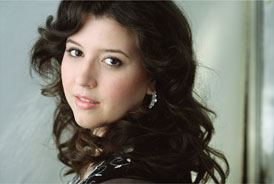 La Cieca predicted a cast change earlier, and what do you know, so it came to pass! Soprano Lisette Oropesa will sing the Tuesday prima of the Met's revival of Le nozze di Figaro and at least one more performance. She is jumping in for the enceinte Isabel Bayrakdarian. Ms. Oropesa is not only a member of the Met's Lindemann Young Artist Development Program but (even more impressively) she is La Cieca's homegirl since she is a graduate of LSU in dear old Baton Rouge! It should be noted, however, that she and La Cieca matriculated in different centuries.
La Cieca predicted a cast change earlier, and what do you know, so it came to pass! Soprano Lisette Oropesa will sing the Tuesday prima of the Met's revival of Le nozze di Figaro and at least one more performance. She is jumping in for the enceinte Isabel Bayrakdarian. Ms. Oropesa is not only a member of the Met's Lindemann Young Artist Development Program but (even more impressively) she is La Cieca's homegirl since she is a graduate of LSU in dear old Baton Rouge! It should be noted, however, that she and La Cieca matriculated in different centuries.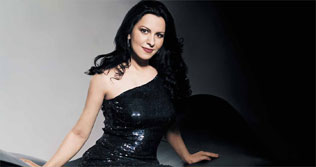 Meanwhile, in Chicago, Angela Gheorghiu has been fired from Lyric Opera's production of La bohème which is scheduled to open Monday, October 1. Thundered General Director William Mason, "Miss Gheorghiu has missed 6 of 10 rehearsals, including the piano dress rehearsal and both staging rehearsals with the orchestra. She missed one of the most critical stage-orchestra rehearsals when she left the city for New York without permission, a direct violation of her contract." La Gheorghiu was in fact spotted in the audience for the Met's prima of Gounod's Roméo et Juliette on Tuesday night.
Meanwhile, in Chicago, Angela Gheorghiu has been fired from Lyric Opera's production of La bohème which is scheduled to open Monday, October 1. Thundered General Director William Mason, "Miss Gheorghiu has missed 6 of 10 rehearsals, including the piano dress rehearsal and both staging rehearsals with the orchestra. She missed one of the most critical stage-orchestra rehearsals when she left the city for New York without permission, a direct violation of her contract." La Gheorghiu was in fact spotted in the audience for the Met's prima of Gounod's Roméo et Juliette on Tuesday night.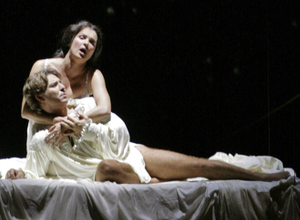 The news is somewhat less dire for other members of the Gheorghiu famille. Those of you cher public who missed out on Roberto "Million Dollar Legs" Alagna's stylish Roméo this week may get another chance at seeing his collaboration with Anna Netrebko in the Gounod love story. La Cieca hears that Alagna will return in December to fill the "TBA" slots on the 8th, 12th and 15th, including the broadcast and HD telecast. Matthew Polenzani, La Cieca hears, will take over the role on December 20.
The news is somewhat less dire for other members of the Gheorghiu famille. Those of you cher public who missed out on Roberto "Million Dollar Legs" Alagna's stylish Roméo this week may get another chance at seeing his collaboration with Anna Netrebko in the Gounod love story. La Cieca hears that Alagna will return in December to fill the "TBA" slots on the 8th, 12th and 15th, including the broadcast and HD telecast. Matthew Polenzani, La Cieca hears, will take over the role on December 20.Labels: alagna, cher public, chicago, la cieca ci guarda la cieca ci vede, met
25 September 2007
The winner and new diva
Our nomination for Camp Diva of the 2007-2008 Season: Miss Blythe Danner!
Labels: 2007, alex ross, broadcast, camp, chat, cher public, dessay, diva, maury d'annato, met, operachic, sieglinde, sirius, stephen costello
24 September 2007
23 September 2007
Something to chat about
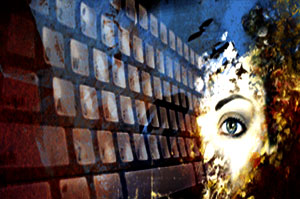 La Cieca's chat returns Monday night to welcome in the new Met season. Topic of discussion: the evening's prima of the new production of Lucia di Lammermoor, as broadcast on SIRIUS Internet Radio
La Cieca's chat returns Monday night to welcome in the new Met season. Topic of discussion: the evening's prima of the new production of Lucia di Lammermoor, as broadcast on SIRIUS Internet RadioNote that any of you who do not have a current subscription to Sirius can get a trial 3-day pass in time for the Opening Night chat. The event is also broadcast on RealNetworks.
Are any of you cher public attending this Lucia at one of the outdoor simulcasts? If you are, why not bring a laptop along and chat along with the rest of us? It's easy, now that the Lincoln Center plaza has WiFi!
Labels: 2007, bel canto, broadcast, chat, cher public, dessay, information wants to be free, met, sirius
21 September 2007
Why did I ever buy him those damn long pants?
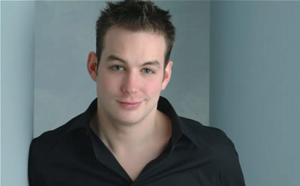 La Cieca is suffering a mild case of Empty Nest Syndrome this afternoon, since she just found out that parterre.com fave Stephen Costello is all grown up. It turns out that Stephen is the "TBA" who will sing Edgardo (his very first!) in Lucia di Lammermoor at the Met on October 25. In this spectacular followup to his scheduled house debut as Arturo next week, Stephen is joined by Annick Massis, Mariusz Kwiecien and John Relyea in a performance conducted by James Levine and broadcast live on Sirius.
La Cieca is suffering a mild case of Empty Nest Syndrome this afternoon, since she just found out that parterre.com fave Stephen Costello is all grown up. It turns out that Stephen is the "TBA" who will sing Edgardo (his very first!) in Lucia di Lammermoor at the Met on October 25. In this spectacular followup to his scheduled house debut as Arturo next week, Stephen is joined by Annick Massis, Mariusz Kwiecien and John Relyea in a performance conducted by James Levine and broadcast live on Sirius.In other TBAlicious news, an artistic administrator or two is breathing a little easier this afternoon as the Met has finally announced completed casting for their new production of Verdi's Macbeth -- only a month before the October 22 opening! Maria Guleghina will sing Lady Macbeth in the "Live in HD" January 12 matinee performance relayed to movie theaters around the world. She will also sing the role on January 9 (which had not been previously announced) and on October 22, 26, 31, and November 3 as scheduled. Andrea Gruber will sing the role of Lady Macbeth on January 5 and 15 (which also had not been announced) as well as on the previously scheduled dates of May 9, 13, and 17. The new production of Macbeth is directed by Adrian Noble.
Labels: la cieca ci guarda la cieca ci vede, levine, met, stephen costello, telecast
20 September 2007
"She runs upstage screaming and then sits on the stairs laughing maniacally" is the new "weeping bitterly, she consents to the horrible bargain"
I'm sure some people will be up in arms over the production. It is set in the mid-19th century. The costumes are decent. Mariusz Kwiecien sounded good although he seemed to oversing at times, but I attribute that too the before noon rehearsal time. At any rate, he sounded amazing. In "Regnava nel silenzio," Zimmerman has an actress appear as the ghost that Lucia sings about. I'm sure some people will get their panties in a knot over it, but I think it was done pretty well.
In the mad scene, the set has a grand spiral stairway which leads to an open hallway which runs the entire length of the stage. Stage left is the bridal room. The top of the stairs is downstage right. Lucia enters wiping the blood of the dagger on her veil and then crosses to the top of the stairs. Just before she sings her first line, she runs down the stairs almost to the bottom of the stairway.
On the lines, "Un gelo me serpeggia nel sen! trema ogni fibra! vacilla il piè!" She slowly slumps to the stairs. She lies down on the step and then, fainting, rolls down the two steps to the stage floor. She eventually crosses downstage to the prompter's box where she sings much of the scene on her back. She sings, "Sparsa è di rose!" after holding up her bloody veil.
Later, she runs upstage screaming and then sits on the stairs laughing maniacally. Between verses of "Spargi d'amaro pianto", a doctor administers a shot (morphine?) which prompts the ornamentation of the second verse. Dessay is completely committed to the stage directions, so it works. I think she sounded good. I wish I had remembered my opera glasses. I was in the family circle.
Labels: 2007, bel canto, dessay, la cieca ci guarda la cieca ci vede, met
17 September 2007
Pregnant with meaning
Labels: la cieca ci guarda la cieca ci vede, met
12 September 2007
Flash Mab
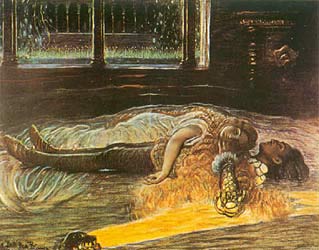 The Met's star-crossed revival of Roméo et Juliette has just hit another bump. Nathan Gunn, announced for Mercutio, has dropped out of the September and October performances of the opera due to illness. Jumping in will be baryhunque Stéphane Degout, who performed Mercutio in this production back in 2005. Gunn is still on the cast list for the December portion of the run.
The Met's star-crossed revival of Roméo et Juliette has just hit another bump. Nathan Gunn, announced for Mercutio, has dropped out of the September and October performances of the opera due to illness. Jumping in will be baryhunque Stéphane Degout, who performed Mercutio in this production back in 2005. Gunn is still on the cast list for the December portion of the run.UPDATE: It just gets worse. Rolando Villazón is now off the Met roster for the season. His Roméo performances (December 8, 12, 15 and 20) have been updated to TBA; the tenor's Carnegie Hall recital is also canceled.
Gossip elsewhere on the web suggests that Villazón may be off the stage for as long as a year.
Labels: 2007, barihunk, la cieca ci guarda la cieca ci vede, met
08 September 2007
Photo finish at Lincoln Center
| Vanessa (NYCO) | 24% | 214 |
| Lucia di Lammermoor (Met) | 24% | 213 |
| Agrippina revival (NYCO) | 12% | 107 |
| Iphigenie en Tauride (Met) | 12% | 106 |
| Macbeth (Met) | 9% | 82 |
| I due Foscari (OONY) | 6% | 51 |
| Margaret Garner (NYCO) | 4% | 37 |
| Romeo et Juliette revival (Met) | 4% | 32 |
| Madama Butterfly revival (Met) | 3% | 28 |
| L’oracolo/L’incantesimo (Teatro Grattacielo) | 2% | 15 |
| total votes: 885 | ||
07 September 2007
Not a comeback, a return!
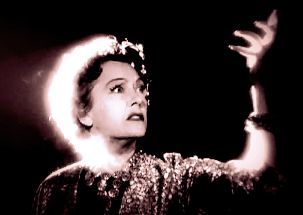 Fans of red-haired three-named sopranos d'un certain âge will rejoice to hear that at least a couple of the mainstays of the Volpe Era have been asked back to the Met under the Gelb Aegis. (And after all that naughty gossip about firings and buyings-out! Who ever heard of such a thing?) Anyway, not to delay the gratification any longer, La Cieca can reveal that the Titian-tressed trinominates in question are Hei-Kyung Hong and Ruth Ann Swenson.
Fans of red-haired three-named sopranos d'un certain âge will rejoice to hear that at least a couple of the mainstays of the Volpe Era have been asked back to the Met under the Gelb Aegis. (And after all that naughty gossip about firings and buyings-out! Who ever heard of such a thing?) Anyway, not to delay the gratification any longer, La Cieca can reveal that the Titian-tressed trinominates in question are Hei-Kyung Hong and Ruth Ann Swenson.La Hong was announced only a couple of days ago as a substitute for the Countess in Le nozze di Figaro on October 2, 6, 10, 13 and 18, replacing Dorothea Röschmann "who has cancelled all engagements for three months for health reasons," per the Met's press office. Less officially, Ms. Swenson is rumored for the 2008-09 season as Musetta in La bohème as a followup to next spring's Violettas, which were at one point assumed to be her farewell to the company.
Labels: diva, gelb, la cieca ci guarda la cieca ci vede, met, ruth ann swenson, scandale
22 August 2007
Kaiser's role
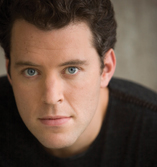 La Cieca has just learned that tenor Joseph Kaiser will make a "surprise" Met debut October 3, singing the role of Roméo in Gounod’s Roméo et Juliette. He will also sing performances on October 6 and 11, replacing the ailing Rolando Villazón.
La Cieca has just learned that tenor Joseph Kaiser will make a "surprise" Met debut October 3, singing the role of Roméo in Gounod’s Roméo et Juliette. He will also sing performances on October 6 and 11, replacing the ailing Rolando Villazón.Kaiser stars as Tamino in Kenneth Branagh's film of The Magic Flute and will reprise this Mozart role later in the Met season. He appeared as Narraboth in Lyric Opera of Chicago's Salome last season, a performance about which the always reliable David Shengold wrote, "The most consistently satisfying vocalism came from Joseph Kaiser, a young tenor on the brink of stardom . . . he sang the challenging high phrases with clarity and shine."
Labels: 2007, hunkentenor, met
14 August 2007
Bobby, come on over for dinner
Labels: alagna, la cieca ci guarda la cieca ci vede, met, villazon
19 July 2007
Melons! Coupons!
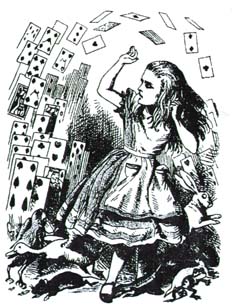 La Cieca just received a press release from the Met detailing some of the cast changes and reshufflings already afoot for next season. She is pretty sure than none of this has anything to do with last night's steam pipe explosion in Midtown.
La Cieca just received a press release from the Met detailing some of the cast changes and reshufflings already afoot for next season. She is pretty sure than none of this has anything to do with last night's steam pipe explosion in Midtown.Angela M. Brown will sing the title role in Aida replacing Maria Guleghina on September 29, October 4 and 16. La Brown will sing the role of Aida on November 2, 5 and 8 as previously scheduled; Micaela Carosi will replace her on October 30.
Maija Kovalevska replaces Krassimira Stoyanova as Micaëla on February 4, 8, 13 and 16. Stoyanova will go on as scheduled at all other performances of Carmen. Lucio Gallo will sing the role of Escamillo (role debut) in all performances of the opera this season.
Ekaterina Siurina replaces Isabel Bayrakdarian as Susanna in Nozze on November 10, 14, 17, 21, 24, 28 and December 1. La Bayrakdarian retains her October 2, 6, 10, 13 and 18 performances.
Matthew Polenzani will sing Roméo opposite Anna Netrebko replacing Rolando Villazón on December 27 and 31. Villazón is still scheduled at all other performances of the opera.
Anthony Dean Griffey now sings the entire run of Peter Grimes; to no one's surprise, Neil Shicoff is a no-show.
Now, here's where it get complicated. Do listen carefully, because La Cieca is only going to say this once. Maria Guleghina gets the prima and the fall run of Macbeth (replacing Andrea Gruber) on October 22, 26, 31 and November 3. Gruber is still scheduled for the May 9, 13, and 17 performances. Meanwhile, Guleghina is out of the November 12, 16, 19 and 23 performances of Norma, with Hasmik Papian leaping into the breach. Guleghina tries her hand at the Bellini on November 26, 30, December 4, and 7. Oh, and on January 5, 9, 12 and 15, our old, old, old friend TBA returns triumphantly to the Met... as Lady Macbeth.
02 July 2007
Does anyone still wear only one hat?
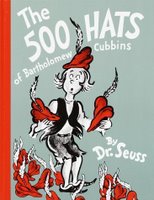 Iconic Ira Siff temporarily puts aside performing and his busy teaching schedule this summer to direct Cosi fan tutte with the Tanglewood Music Center young artists, in collaboration with Maestro James Levine. The Mozart comedy runs August 11-14. La Cieca further hears whispers that due to the overwhelmingly positive response to Ira's guest appearances on last year's Met/Sirius broadcasts, he will be promoted to co-host status opposite Margaret Juntwait on that series beginning this fall.
Iconic Ira Siff temporarily puts aside performing and his busy teaching schedule this summer to direct Cosi fan tutte with the Tanglewood Music Center young artists, in collaboration with Maestro James Levine. The Mozart comedy runs August 11-14. La Cieca further hears whispers that due to the overwhelmingly positive response to Ira's guest appearances on last year's Met/Sirius broadcasts, he will be promoted to co-host status opposite Margaret Juntwait on that series beginning this fall.Labels: broadcast, crossover, la cieca ci guarda la cieca ci vede, levine, met, sirius
14 June 2007
Trittichat
09 June 2007
Stella for star
 Just a few quick words about the magnificent soprano Antonietta Stella, the "tie-breaker" in our recent quiz. She is perhaps not quite so familiar to some of La Cieca's readers as the more celebrated divas also heard on the track such as Tebaldi and Price. La Cieca will quote her dear colleague Enzo Bordello, who wrote eloquently about this singer in 1998:
Just a few quick words about the magnificent soprano Antonietta Stella, the "tie-breaker" in our recent quiz. She is perhaps not quite so familiar to some of La Cieca's readers as the more celebrated divas also heard on the track such as Tebaldi and Price. La Cieca will quote her dear colleague Enzo Bordello, who wrote eloquently about this singer in 1998:". . . her 1957 broadcast performance [of Tosca] with Tucker and Warren is sensational. The voice is confidently produced, with plenty of healthy, glowing tone. She tosses off the role's many high B's and C's like they were child's play....
"The long and the short of the matter is that I simply adore Antonietta Stella. What did she do well, you ask? Well, I would reframe the question this way: what did she NOT do well? Although I never saw Stella in the theater, I can honestly say that few singers have thrilled me as much as she on records and video. At its best, the voice represents the highest standard of Italian lirico-spinto singing. There is a morbidezza in the sound that is ravishing. In addition to producing focused high notes, Stella sang with unforced resonance in the lower register. The legato is melting and her pianiszimo singing ranks with the best of anyone."
Antonietta Stella sings "Vissi d'arte"
Stella on YouTube
10 May 2007
Morris is less
Labels: countertenor, daniels, gay gay gay gay gay, great homosexuals of history, levine, met
Crones on notice
Continues our spy, "Not a surprising move, but one taken earlier than I would have thought in his tenure, since [Palumbo's] tenure really hasn’t started yet. But thank Goddess for it – the soprano section has been a mess for quite a while."
Labels: 2008, filth, la cieca ci guarda la cieca ci vede, met
09 May 2007
Which Puritani: discuss.
The frisson that Anna Netrebko created at Met recently piqued my interest in the work again- but I find myself dissatisfied with the array of recordings available. Joan I’d have to quickly count out- a lot of the time it sounds like she’s singing the phone book. Not a Bonynge fan either. Ditto La Sills- I just don’t like the timbre of her voice. I own the Caballe/Kraus recording and enjoy it- even without most of the high notes and no trill from Montsy. Despite that she always wins me over and Kraus makes a good fist of Arturo- I don’t understand the negative crits he got for this recording. When are people going to realise that the high D’s and high F were not meant to be sung full voice- I feel sure they were supposed to be sung in head voice- esp as Arturo is at his most miserable when these notes pop up.
Devia is good, albeit a little colourless. Mateuzzi has the high notes- shame everything under a G is flat, flat, flat. Have you heard the Freni/Pav recordings? I’m interested to hear them. I also have the Callas recording- but I can’t BEAR Di Stefano- too much scooping and painful open high notes. Is there a fabulous recording I’ve missed? If only La Scotto had done it- she would have been ideal. (I too am a Scotto worshipper!)
Any suggestions greatly appreciated!
Labels: bel canto, caballe, callas, cher public, discuss, met
08 May 2007
Wie alles war, weiss ich; wie alles wird, wie alles sein wird
New York, NY (May 8, 2007) - Bizet's Carmen with Russian mezzo-soprano Olga Borodina in the title role will be revived during the Met's 2007-08 season, replacing the previously announced performances of Offenbach's Les Contes d'Hoffmann. The change in repertory is due to the decision by Argentine tenor Marcelo Álvarez to retire the title role of Hoffmann from his repertory. Mr. Álvarez will instead make his Met role debut singing Don José in Carmen opposite Ms. Borodina. Nancy Fabiola Herrera will sing the title role in one performance. Krassimira Stoyanova sings the role of Micaëla at the Met for the first time. Emmanuel Villaume conducts all eight performances from February 4 to March 1, 2008.Told you so.
Labels: 2008, ex cathedra, la cieca ci guarda la cieca ci vede, met
03 May 2007
"Tales" untold
Labels: 2008, la cieca ci guarda la cieca ci vede, met
02 May 2007
News from the underworld
"This show is awesome. The dancing is really interesting and fits the music very well. Donald Palumbo has really worked tirelessly to make the chorus sound as good as possible, giving notes and comments all through rehearsals. I’m told from long-time members that note sessions during dress rehearsals were quite rare. David Daniels is great in this part, and he sings it so well. Maija Kovalevska is a hottie, and has a beautiful voice. She is tall and striking and pairs physically very well with David. And Heidi Grant Murphy has perhaps the entrance of the season. I won’t give it away, but your jaw will drop. Mine did .... Bring your spyglasses to try and figure out as many of the 'dead characters' in the chorus as you can!"
Labels: countertenor, daniels, met
26 April 2007
23 April 2007
Take that, Eurotrash!
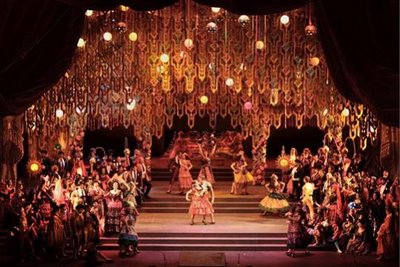
Oh, if only we could have a production of Traviata just like this here in New York! Or, even better, if only we could have two productions just like this!
21 April 2007
Third base
Labels: la cieca ci guarda la cieca ci vede, met
18 April 2007
Kitty Carlisle Hart, 1910-2007
A more detailed obituary may be found at broadwayworld.com.
Here's Kitty Carlisle Hart in a scene from A Night at the Opera, with Allan Jones (and, of course, the Marx Brothers!)
17 April 2007
Great minds
Labels: la cieca ci guarda la cieca ci vede, met
16 April 2007
Avant le deluge
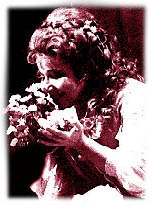 La Cieca is no big believer in omens, but she must say that within a hour of Aprile Millo's final curtain call on the Met stage Saturday night, all hell broke loose over New York. Not exactly "stars with trains of fire and dews of blood/Disasters in the sun" but certainly a messy and unseasonable Nor'easter. Time will tell whether this downpour foretells the end of an era. Meanwhile, La Cieca will do her job and report that among La Millo's public she glimpsed Elaine Stritch, Rufus Wainwright and Patti Smith, all of whom made the pilgrimage backstage to meet and greet the diva. Also in evidence were Violeta Urmana and Salvatore Licitra, plus of course every opera queen you might care to mention. A few fans attempted to serenade Millo with "Happy Birthday" during her solo bow, but were inaudible over the applause and cheers.
La Cieca is no big believer in omens, but she must say that within a hour of Aprile Millo's final curtain call on the Met stage Saturday night, all hell broke loose over New York. Not exactly "stars with trains of fire and dews of blood/Disasters in the sun" but certainly a messy and unseasonable Nor'easter. Time will tell whether this downpour foretells the end of an era. Meanwhile, La Cieca will do her job and report that among La Millo's public she glimpsed Elaine Stritch, Rufus Wainwright and Patti Smith, all of whom made the pilgrimage backstage to meet and greet the diva. Also in evidence were Violeta Urmana and Salvatore Licitra, plus of course every opera queen you might care to mention. A few fans attempted to serenade Millo with "Happy Birthday" during her solo bow, but were inaudible over the applause and cheers.Curiously, the great moment in Millo's performance wasn't "La mamma morta," (which was very good if a little hectic) but rather the phrase "Benedico il destino! Benedico la morte!" just before the final duet. If you need a definition of what Milanov called "vocal message," that's what Millo demonstrated in this handful of notes. And need I say she communicated more in those few seconds than many other artists do in a whole season.
09 April 2007
Optional cuts
05 April 2007
The Swenson solution
Labels: met, ruth ann swenson, this diva looks like that diva
Ruth's no stranger to friction
And now La Cieca is going to throw this one open to discussion from the floor!
CORRECTION: Swenson is also contracted to sing Violetta during the Met's 2007-2008 season.
Labels: daniels, diva, gelb, la cieca ci guarda la cieca ci vede, met, nyt, ruth ann swenson, sad
03 April 2007
Sing a little, chat a little
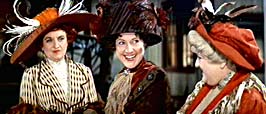 La Cieca (not pictured) reminds her cher public that tonight's 40th Anniversary of the Met at Lincoln Center gala will be the subject of an online chat right here at parterre.com.
La Cieca (not pictured) reminds her cher public that tonight's 40th Anniversary of the Met at Lincoln Center gala will be the subject of an online chat right here at parterre.com.The program, starring Anna Netrebko and Rolando Villazón, begins at 7:00 PM and so the chat room will open at 6:45. Maestro Bertrand de Billy will lead the duo in staged performances of La bohème, Act I (with Mariusz Kwiecien as Marcello); Manon Act III, scene 2 (with Samuel Ramey as the Comte des Grieux); and L’elisir d'amore Act II with Mr. Kwiecien as Belcore and Alessandro Corbelli as Dulcamara.
Labels: chat, cher public, gala, met, netrebko, sirius, villazon
30 March 2007
Dignity returns to the NYC opera scene
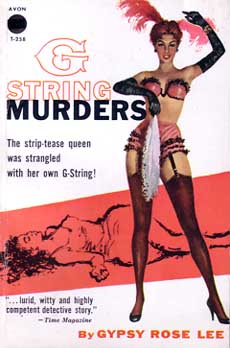 On April 17, Dame Kiri te Kanawa returns to the scene of... well, not a crime, actually, more like a triumph: that is, her surprise Met debut in Otello way back in 1974. No, she's not singing, but on April 17 she will make a personal appearance at the Metropolitan Opera Shop, to greet her fans and sign CDs from 12:30 pm to 1:30 pm.
On April 17, Dame Kiri te Kanawa returns to the scene of... well, not a crime, actually, more like a triumph: that is, her surprise Met debut in Otello way back in 1974. No, she's not singing, but on April 17 she will make a personal appearance at the Metropolitan Opera Shop, to greet her fans and sign CDs from 12:30 pm to 1:30 pm.The following day, the controversial Kiwi canary will grace this year's Metropolitan Opera Guild Luncheon at the Waldorf-Astoria. The alphabetical list of singers and other colleagues who are scheduled to honor the diva includes Licia Albanese, Martina Arroyo, Harry Bicket, Stephanie Blythe, Russell Braun, Lawrence Brownlee, Barbara Cook, Mignon Dunn, Barbara Frittoli, Massimo Giordano, Maria Guleghina, Marilyn Horne, James Morris, Regina Resnik, Julius Rudel, Beverly Sills, Risë Stevens, Ruth Ann Swenson, and Benita Valente. (Apparently Joann Yockey and Linda Zoghby had prior commitments.)
Mezzo-soprano Frederica von Stade will do the vocal honors and the program will also include "rare" video clips of the honoree. Tickets to the Luncheon are $250 and $400.
28 March 2007
Balcony box
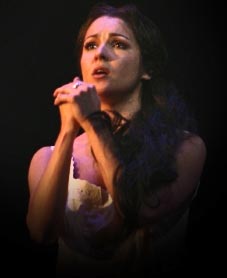 Something new and interesting (La Cieca hopes) on Unnatural Acts of Opera: a 2004 concert performance of Bellini's I Capuleti e i Montecchi, starring Anna Netrebko (Giulietta), Daniela Barcellona (Romeo) and Joseph Calleja (Tebaldo). Act One is the current podcast, with the second to follow on Friday.
Something new and interesting (La Cieca hopes) on Unnatural Acts of Opera: a 2004 concert performance of Bellini's I Capuleti e i Montecchi, starring Anna Netrebko (Giulietta), Daniela Barcellona (Romeo) and Joseph Calleja (Tebaldo). Act One is the current podcast, with the second to follow on Friday.Speaking of the lovely Miss Netrebko, she and Rolando Villazon will headline a gala celebrating 40th Anniversary of The Met at Lincoln Center next Tuesday. The concert will be webcast over the Met's RealNetworks (and of course Sirius) beginning at 7:00 PM. Unfortunately, La Cieca has a prior commitment that night, but she is sure that you, her cher public, will want to chat about the gala here at parterre.com. As such, La Cieca is sending out request to you parterre.com regulars for volunteers to host the web chat. (Quite simple, really: you'll need only to be online and on the chat site beginning at 6:45 and continuing until the finish of the broadcast.) If you're interested in helping out, email La Cieca at [email protected].
Labels: bel canto, broadcast, cher public, diva, met, netrebko, podcast, sirius, villazon
26 March 2007
24 March 2007
Semi-ubiquitous
Labels: blog, camp, critic, diva, drag, filth, fleming, gay gay gay gay gay, gcn, la cieca ci guarda la cieca ci vede, maury d'annato, met, midgette, nyco, nyt, our own, parody, podcast, review, voigt, youtube
23 March 2007
Mary Dunleavy joins in the fun
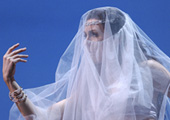 La Cieca has just been informed that soprano Mary Dunleavy will participate in tonight's panel discussion "Opera and Technology" at The Italian Academy for Advanced Studies in America at Columbia University. No word on whether La Dunleavy replaces or supplements the previously announced Lucy Shelton. Our own JJ will be there of course, along with a veritable constellation of opera pundits: Elena Park, Editorial and Creative Content, The Metropolitan Opera; Beth Greenberg, stage director, New York City Opera; Wayne Koestenbaum, poet and writer; and Anne Midgette, critic, The New York Times. That's tonight at 7:30 PM, 1161 Amsterdam Avenue (between 116th and 118th Streets), second floor.
La Cieca has just been informed that soprano Mary Dunleavy will participate in tonight's panel discussion "Opera and Technology" at The Italian Academy for Advanced Studies in America at Columbia University. No word on whether La Dunleavy replaces or supplements the previously announced Lucy Shelton. Our own JJ will be there of course, along with a veritable constellation of opera pundits: Elena Park, Editorial and Creative Content, The Metropolitan Opera; Beth Greenberg, stage director, New York City Opera; Wayne Koestenbaum, poet and writer; and Anne Midgette, critic, The New York Times. That's tonight at 7:30 PM, 1161 Amsterdam Avenue (between 116th and 118th Streets), second floor.Labels: 2008, blog, camp, critic, diva, filth, gay, jj, met, midgette, nyco, nyt, our own, podcast, youtube
21 March 2007
Annals of g-string jurisprudence: an update
The Kiwi canary testified that it was only after agreeing to appear on a concert program with veteran pop icon John Farnham that she discovered that some of his fans expressed their enthusiasm by throwing their panties onstage.
The diva, noting that Farnham collected the frilly underthings "as a sort of trophy," sniffed that she would find performing in such a milieu "disrespectful."
Dame Kiri is pictured at right performing a scene from Mozart's Don Giovanni with a fellow paragon of operatic decorum, Bryn Terfel.
16 March 2007
Le mot du jour
Labels: maury d'annato, met
13 March 2007
At a glance
11 March 2007
Tech talk
05 March 2007
Event horizon
Opening night 2008 will be a Renee Fleming gala showcasing The Beautiful Voice in acts from La traviata, Manon and Il pirata. Also in the season's opening weeks: Karita Mattila returns in Salome, Anna Netrebko and Rolando Villazon team for Lucia (HD simulcast for sure!), La Gioconda with the triple-diva goodness of Deborah Voigt, Olga Borodina and Ewa Podles, plus, for a little 21st century flava, the Met premiere of John Adams' Doctor Atomic featuring Audra MacDonald.
At the other end of the season, late spring 2009, the last revival of the rocks-n-rags Ring with James Levine conducting (start queuing for that one now) and
- La sonnambula (Natalie Dessay/Juan Diego Florez)
- Thais (Fleming/Thomas Hampson)
- Rusalka (also Fleming)
- La rondine (Angela Gheorghiu/Roberto Alagna)
- Tristan und Isolde (Daniel Barenboim)
- Eugene Onegin (Mattila/Hampson)
- Cav/Pag (Alagna in both operas)
Labels: 2008, dessay, fleming, la cieca ci guarda la cieca ci vede, mattila, met, netrebko, villazon, voigt
27 February 2007
To infinity, and beyond!
The biggest news this morning was something unspoken. Instead, it was Levine's body language, which (in contrast to previous years) suggested he is both comfortable and secure working with Gelb. Levine stayed for the entire press conference and was particularly attentive when Phillip Glass was speaking.
Mr. Gelb reflected on the successes of the current season, which include:
- An increased audience for the HD simulcasts, now up to 250 screens for Eugene Onegin
- The box office (though "not necessarily a thermometer") is running nine percentage points higher than this point last season
- This season so far 61 performances have sold out, in contrast to 20 sellouts for the entire 2006-2006 season
- Eight HD presentations are booked for next year
- Opening night 2007 (new production of Lucia di Lammermoor) will be simulcast in the plaza, and the Met is in negotiations with NYC to show it in Times Square as well.
Tweaks to next season include revival of the Anthony Minghella Butterfly with Patricia Racette and Roberto Alagna, Barbiere and (as reported by La Cieca a while ago) The First Emperor.
Mary Zimmerman (funny, unpretentious and smart) talked about her production of Lucia. Scene changes in this staging will be done "a vista."
Glass and associate director and designer Julian Crouch introduced Satyagraha. The composer stressed the political and social content of the work, and Crouch talked about how the set materials of corrugated iron and newspaper were suggested by the themes of the opera.
Stephen Wadsworth waxed un peu teachy-teachy on the subject of Iphigénie en Tauride ("Gluck was an ethnic Czech, did you know that?"), but, as Dawn Fatale pointed out, at least the set does not include a built-in shower. The edition of the score will be based on Gluck's Vienna revision, in which Oreste is a tenor, presumably in order to facilitate the participation of Placido Domingo.
The other producers appeared on video. The most buzzworthy statement from this segment was from Adrian Noble, who says the design of his Macbeth is suggested by photographs by Diane Arbus.
The cutest stage director of the whole group was Laurent Pelly (La Fille du Régiment), with Crouch and Richard Jones (Hansel and Gretel) tied for second.
Zoe Caldwell will the the Duchesse de Krakenthorp.
In response to reporters' questions, Gelb said that the Met has negotiated rights to release all its archival performances on CD, DVD, download on demand and "media not yet invented." Anne Midgette asked if there were updates on new commissions by the Met, but Gelb declined to comment, saying that the Met would have a statement later this season.
And then, finger sandwiches and coffee on the Bass Grand Tier, where yet another of parterre.com's web of reliable sources noted that the Gérard Mortier/NYCO deal is all but signed on the dotted line.
Labels: alagna, domingo, first emperor, gelb, levine, met, midgette, mortier, nyco
26 February 2007
Hello, Mister Wilson!
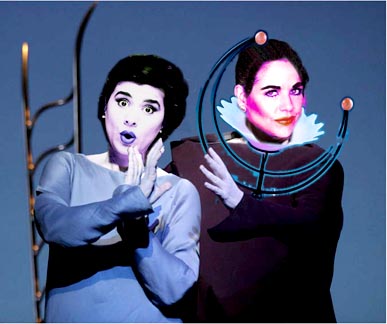
UPDATE: The role of Adalgisa in the Fleming/Wilson Norma scheduled for 2011 will not, as La Cieca puckishly suggested, be sung by Cecilia Bartoli. In fact she has just been informed by one of her most impeccable sources that the part will go to Elīna Garanča.And in other exclusive Decca recording artist/avant-garde legend related news, the Schwartz gallery at the Met is awaiting installation of a Robert Wilson "video portrait" of La Fleming. La Cieca will inform you when the Wilson film makes it on to YouTube.
Labels: 2011, fleming, la cieca ci guarda la cieca ci vede, met, nyt, youtube
Vilar to "Post"

25 February 2007
It's not a comeback
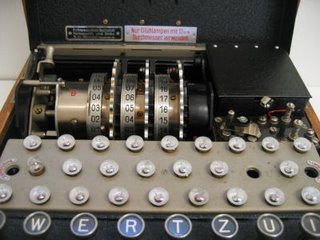 The final act of Loreley is hardly the only attraction on the current episode of Unnatural Acts of Opera. La Cieca also salutes the birthdays of three of the greatest sopranos of all time, and, can you believe it, presides over the return of one of your all-time favorite features, "The Enigmas of La Cieca." Once more, cher public, you can play "opera quiz" from the comfort and safety of your own lovely homes, without the difficultly of slogging through the snow to List Hall, or, for that matter, the difficulty of slugging Anthony Laciura once you get there. (Who knew it was possible to channel Eddie Cantor? Who knew anyone wanted to?) But anyway, as La Cieca was saying, do lend an ear to the new Unnatural Acts of Opera, listen to La Cieca's enigma, and (if you dare) send you answer to the question to [email protected]. The first correct response received will win a tantalizing gift from handelmania.com.
The final act of Loreley is hardly the only attraction on the current episode of Unnatural Acts of Opera. La Cieca also salutes the birthdays of three of the greatest sopranos of all time, and, can you believe it, presides over the return of one of your all-time favorite features, "The Enigmas of La Cieca." Once more, cher public, you can play "opera quiz" from the comfort and safety of your own lovely homes, without the difficultly of slogging through the snow to List Hall, or, for that matter, the difficulty of slugging Anthony Laciura once you get there. (Who knew it was possible to channel Eddie Cantor? Who knew anyone wanted to?) But anyway, as La Cieca was saying, do lend an ear to the new Unnatural Acts of Opera, listen to La Cieca's enigma, and (if you dare) send you answer to the question to [email protected]. The first correct response received will win a tantalizing gift from handelmania.com.Labels: cher public, met, podcast, quiz
21 February 2007
Comeback kid
The Walküre performances run through February 9, 2008, with a cast that includes Lisa Gasteen (Brünnhilde), Adrianne Pieczonka/Deborah Voigt (Sieglinde), Stephanie Blythe/Michelle DeYoung (Fricka), Clifton Forbis/Simon
20 February 2007
No time for "Tragedy"
Labels: first emperor, la cieca ci guarda la cieca ci vede, met
15 February 2007
Blonde Item
The live Met/Sirius broadcast of Bellini's I puritani featuring Futral begins at 7:30 Eastern and the taped PBS telecast with Netrebko begins at 9:00. That's here in New York on good old Channel 13. Don't forget to check your local listings.
Anyway, La Cieca will open up the Duelling Elviras Chat Room at 7:15 for the frenzied festivities.
11 February 2007
Fan club
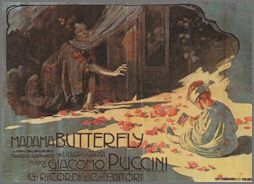 In observance of the 100th anniversary of the Metropolitan Opera premiere of Madama Butterfly, La Cieca presents a podcast featuring the original cast of that production: Geraldine Farrar, Enrico Caruso and Antonio Scotti. The three superstars are heard in ten selections from Puccini's score.
In observance of the 100th anniversary of the Metropolitan Opera premiere of Madama Butterfly, La Cieca presents a podcast featuring the original cast of that production: Geraldine Farrar, Enrico Caruso and Antonio Scotti. The three superstars are heard in ten selections from Puccini's score.Unnatural Acts of Opera
09 February 2007
Not only connect...
Our publisher JJ's first opera of 2007, reviewed in Gay City News.
Labels: diva, gay gay gay gay gay, gcn, mattila, met, review, silja
Voce di primavera
Labels: la cieca ci guarda la cieca ci vede, met, scotto
06 February 2007
I want to dish a prima donna, donna, donna
Which diva (not the same one) is in talks to return to the Met in the same fach she "abandoned" over a decade ago?
Which diva (neither of the above) seems to be inching her way out of the closet, if her most recent biographical information is to be believed?
Labels: diva, la cieca ci guarda la cieca ci vede, met
31 January 2007
Metrosexual
The all-inclusive $95 ticket includes an orchestra seat with a chance to mingle with other opera lovers, a pre-performance hors d’oeuvres reception and a champagne-dessert reception at intermission during which time you can sneak a peek at the exhibition of Callas's stage jewelry. (And with all that gaiety going on, La Cieca wouldn't be surprised to if she saw go-go boys in skimpy gold shorts giving lap dances in Grand Tier boxes.) More details and ordering instructions are on the new improved metopera.org.
Labels: gay gay gay gay gay, mattila, met, silja
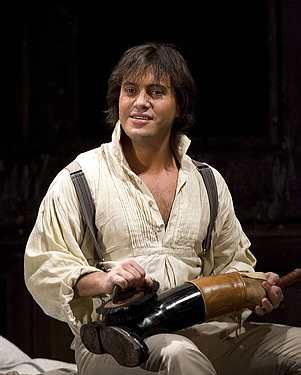 Reactions to last night's Figaro prima? Anyone?
Reactions to last night's Figaro prima? Anyone?










